Auryn Intersects 116 meters of 0.58% Copper Equivalent in Historical Drill Core from Auryn's Fierrazo Target at Sombrero
VANCOUVER, BC / ACCESSWIRE / June 13, 2019 / Auryn Resources Inc. (TSX: AUG, NYSE AMERICAN: AUG, "Auryn" or the "Company") is pleased to announce results from eight historical drill holes, totaling 988 meters of drilling, from the Fierrazo target at the Sombrero project in Southern Peru. These holes were drilled in 2013 targeting iron skarn mineralization, however Auryn's assay results encountered copper-gold mineralization in each hole. Highlights include 116 meters of 0.58% copper equivalent (0.42% Cu and 0.24 g/t Au), 90.4 meters of 0.51% copper equivalent (0.48% Cu and 0.05 g/t Au) and 51 meters of 0.53% copper equivalent (0.43% Cu and 0.16 g/t Au) (Figure 1 & Table 1).
Significance of the Results:
- Copper-gold sulphide mineralization extends to depth underneath the previously reported surface channel sample of 232 meters of 0.55% Cu equivalent (see April 3, 2019 release).
- Copper-gold mineralization encountered at the Fierrazo target provides a clear analogue to discover additional large-scale mineralized exoskarn bodies within the Sombrero property, based on similar geophysical and geochemical signatures.
- The mineralization encountered in the historical drill holes confirms Auryn's belief that Sombrero has analogous geological and mineralization characteristics of the deposits of the Las Bambas district.
A Message from Michael Henrichsen, COO & Chief Geologist:
"The presence of a cohesive copper-gold exoskarn body at Fierrazo has given us a great deal of confidence in terms of discovering other large-scale exoskarn bodies, which could make Sombrero a world-class discovery. Fierrazo is only a small window into the potential sub-surface mineralization and we are very excited for what's to come for the rest of the Sombrero Main system, where drill permits are in process."
Table 1:
| Significant Intercepts - Historical Drill Holes* | |||||||||||||||||||||||
| Hole ID | From (m) | To (m) | Interval (m) | Cu (%) | Au (g/t) | CuEQ % | |||||||||||||||||
| FE-DDH-01A | 0 | 90.4 | 90.4 | 0.48 | 0.05 | 0.51 | |||||||||||||||||
| including | 46.2 | 88 | 41.8 | 0.88 | 0.02 | 0.89 | |||||||||||||||||
| FE-DDH-01B | 0 | 64.1 | 64.1 | 0.32 | 0.08 | 0.37 | |||||||||||||||||
| including | 0 | 33.5 | 33.5 | 0.51 | 0.13 | 0.59 | |||||||||||||||||
| FE-DDH-02 | 0 | 51 | 51 | 0.43 | 0.16 | 0.53 | |||||||||||||||||
| including | 3.05 | 24 | 20.95 | 0.70 | 0.25 | 0.85 | |||||||||||||||||
| 59 | 111 | 52 | 0.17 | 0.07 | 0.21 | ||||||||||||||||||
| 131 | 137 | 6 | 0.15 | 0.02 | 0.16 | ||||||||||||||||||
| 151 | 165 | 14 | 0.36 | 0.19 | 0.48 | ||||||||||||||||||
| including | 155 | 161 | 6 | 0.58 | 0.34 | 0.80 | |||||||||||||||||
| 177 | 204 | 27 | 0.17 | 0.28 | 0.35 | ||||||||||||||||||
| FE-DDH-03A | 0 | 116 | 116 | 0.42 | 0.24 | 0.58 | |||||||||||||||||
| including | 0 | 64 | 64 | 0.64 | 0.38 | 0.88 | |||||||||||||||||
| FE-DDH-03B | 0.6 | 51.4 | 50.8 | 0.44 | 0.15 | 0.53 | |||||||||||||||||
| FE-DDH-04 | 0 | 125.25 | 125.25 | 0.20 | 0.14 | 0.29 | |||||||||||||||||
| including | 11.4 | 22.4 | 11 | 0.41 | 0.34 | 0.63 | |||||||||||||||||
| and | 94 | 115.6 | 21.6 | 0.33 | 0.21 | 0.46 | |||||||||||||||||
| FE-DDH-05 | 5.6 | 82 | 76.4 | 0.31 | 0.14 | 0.4 | |||||||||||||||||
| including | 20 | 25.65 | 5.65 | 0.80 | 0.14 | 0.89 | |||||||||||||||||
| and | 39.25 | 67 | 27.75 | 0.41 | 0.20 | 0.53 | |||||||||||||||||
| FE-DDH-06 | 21 | 73 | 52 | 0.24 | 0.06 | 0.27 | |||||||||||||||||
| including | 23.1 | 36.55 | 13.45 | 0.42 | 0.10 | 0.48 | |||||||||||||||||
| * No less than 5m of >= 0.1 % Cu, maximum dilution 6m; metal price used for CuEq calculations: gold price US $1300/oz, copper price US $3/lb (see technical disclosure: Historical Fierrazo Diamond Drill Hole (DDH) re-sampling 2019 (Sombrero)) | |||||||||||||||||||||||
The Fierrazo Target:
Geology:
The historical drilling at the Fierrazo target has defined a cohesive body of copper-gold exoskarn mineralization at the lateral contact between the Ccasscabamba diorite sill and the Ferrobamba limestones and Upper Mara shales and siltstones (Figure 2). The exoskarn body is characterized by massive to semi-massive magnetite and disseminated chalcopyrite and pyrite mineralization that can be cut by high-grade gold retrograde structures with chlorite and epidote alteration. Copper-gold is hosted within the Ferrobamba limestone, the calcareous shales and siltstones of the Upper Mara Formation, within late-stage monzonitic porphyry dykes, and as endoskarn mineralization within the Ccasscabamba diorite sill (Figures 2, 3, 4, 5, & 6).
The majority of the drilling at the Fierrazo target intersected copper-gold mineralization within the calcareous sediments of the Upper Mara Formation due to the fact that the majority of the Ferrobamba limestone has been eroded away at this target area (Figures 7 & 8).This is important as it demonstrates an additional 70 - 100 meters of prospective stratigraphy for copper-gold mineralization that had been previously unrecognized within the Sombrero project area. Combining the Upper Mara Formation with the 225 meters of the Ferrobamba limestone along the margins of the Ccasscabamba diorite sill demonstrates a minimum of 300 meters of prospective stratigraphy for exoskarn mineralization within the Sombrero project area.
Drill Results:
Collectively, the historical drill holes define a mineralized body totaling 300 meters of strike length with an average width of approximately 150 - 200 meters that is open both to the north and to the south (Figure 1). The average grades of all intercepts within the historical core is 0.5% copper equivalent, calculated using a 0.15% copper cut-off grade, as presented below in Table 2. This average grade compares favorably to other deposits in the Las Bambas district such as Constancia, Antacapay, Haquira, and Las Bambas projects (Table 3). In addition, when calculating the average grades based on the lithology within the historical drill core at Fierrazo, it is observed that the grade within the calcareous shales and siltstones of the Upper Mara Formation is 0.46% copper equivalent compared to 0.59% copper equivalent within the Ferrobamba limestone (Table 4). Auryn's technical team believes it is then reasonable to assume this grade relationship will be consistent when exploring other exoskarn targets, such as at the Chumpi target where higher grades could be encountered within the Ferrobamba limestone (Figure 9).
Table 2:
| Combined Weighted Average of All Historical Drill Intercepts* | ||||||||||||||||||||||
| Combined COG % Cu | Length (m) | Cu (%) | Au (g/t) | CuEQ (%) | AuEQ (g/t) | |||||||||||||||||
| 0.10 | 725 | 0.33 | 0.14 | 0.42 | 0.66 | |||||||||||||||||
| 0.15 | 554 | 0.4 | 0.16 | 0.5 | 0.79 | |||||||||||||||||
| 0.20 | 439 | 0.46 | 0.18 | 0.57 | 0.91 | |||||||||||||||||
| 0.30 | 297 | 0.57 | 0.20 | 0.70 | 1.10 | |||||||||||||||||
| *Combined weighed average of all historical drill intercepts were calculated using COG 0.15% Cu | ||||||||||||||||||||||
Table 3:
| Deposits in the Las Bamba District | ||||||||||||||||
| Resource Category | Tonnes (MT) | Cu (%) | Au (ppm) | Mo (ppm) | ||||||||||||
| Constancia (Hudbay)1 | ||||||||||||||||
| Measured & Indicated (Estimates inclusive of reserves) | 881.6 | 0.25 | 0.033 | 77 | ||||||||||||
| Inferred (Estimates inclusive of reserves) | 54.1 | 0.24 | 0.018 | 43 | ||||||||||||
| Antapaccay (Glencore)2 | ||||||||||||||||
| Measured & Indicated | 592 | 0.45 | 0.09 | 50 | ||||||||||||
| Inferred | 157 | 0.40 | 0.10 | 50 | ||||||||||||
| Haquira (First Quantum)3 | ||||||||||||||||
| Measured & Indicated (In pit) | 560.936 | 0.485 | 0.033 | 100 | ||||||||||||
| Inferred (In pit) | 307.781 | 0.372 | 0.022 | 70 | ||||||||||||
| Las Bambas (MMG)4 | ||||||||||||||||
| Measured (Ferrobamba Primary Cu) | 546 | 0.6 | 0.05 | 204 | ||||||||||||
| Indicated (Ferrobamba Primary Cu) | 426 | 0.61 | 0.05 | 204 | ||||||||||||
| Inferred (Ferrobamba Primary Cu) | 252 | 0.63 | 0.05 | 169 | ||||||||||||
| Measured (Chalcobamba Primary Cu) | 75 | 0.44 | 0.02 | 148 | ||||||||||||
| Indicated (Chalcobamba Primary Cu) | 179 | 0.67 | 0.03 | 140 | ||||||||||||
| Inferred (Chalcobamba Primary Cu) | 33 | 0.54 | 0.03 | 142 | ||||||||||||
| Indicated (Sulfobamba Primary Cu) | 89 | 0.65 | 0.02 | 168 | ||||||||||||
| Inferred (Sulfobamba Primary Cu) | 106 | 0.56 | 0.02 | 118 | ||||||||||||
| Source:
|
Table 4:
| Average Grade of All Historical Drill Intercepts Based on Lithology | |||||||||||||||||||||||
| COG % Cu | Major Lithology | Length (m) | Cu (%) | Au (g/t) | CuEQ (%) | AuEQ (g/t) | |||||||||||||||||
| 0.10 | Intrusive equigranular | 48.75 | 0.41 | 0.15 | 0.51 | 0.81 | |||||||||||||||||
| Intrusive porphyritic | 23.9 | 0.48 | 0.05 | 0.51 | 0.81 | ||||||||||||||||||
| Limestone | 80.65 | 0.38 | 0.19 | 0.50 | 0.79 | ||||||||||||||||||
| Sediment | 571.65 | 0.30 | 0.13 | 0.39 | 0.61 | ||||||||||||||||||
| 0.15 | Intrusive equigranular | 48.15 | 0.46 | 0.17 | 0.57 | 0.90 | |||||||||||||||||
| Intrusive porphyritic | 23.9 | 0.67 | 0.03 | 0.69 | 1.09 | ||||||||||||||||||
| Limestone | 66.25 | 0.45 | 0.22 | 0.59 | 0.93 | ||||||||||||||||||
| Sediment | 419.1 | 0.36 | 0.15 | 0.46 | 0.72 | ||||||||||||||||||
| 0.20 | Intrusive equigranular | 48.15 | 0.47 | 0.18 | 0.58 | 0.91 | |||||||||||||||||
| Intrusive porphyritic | 21.5 | 0.74 | 0.03 | 0.76 | 1.20 | ||||||||||||||||||
| Limestone | 66.25 | 0.48 | 0.24 | 0.63 | 0.99 | ||||||||||||||||||
| Sediment | 302.5 | 0.44 | 0.18 | 0.55 | 0.88 | ||||||||||||||||||
| 0.30 | Intrusive equigranular | 48.15 | 0.49 | 0.19 | 0.61 | 0.97 | |||||||||||||||||
| Intrusive porphyritic | 21.5 | 0.88 | 0.02 | 0.89 | 1.41 | ||||||||||||||||||
| Limestone | 60.85 | 0.56 | 0.30 | 0.75 | 1.19 | ||||||||||||||||||
| Sediment | 166 | 0.55 | 0.20 | 0.67 | 1.07 | ||||||||||||||||||
Geophysical Exoskarn Analogue:
The encountered copper-gold mineralization hosted within exoskarn bodies at Fierrazo has provided a clear and direct analogue for other areas of exoskarn mineralization, with a particular focus on Auryn's Chumpi target which has a 3.3 kilometer strike length (Figure 9). The geophysical responses that characterize exoskarn mineralization at Fierrazo are as follows for oxide and hypogene mineralization respectively: 1) Oxide mineralization is mapped in geophysics as a magnetic only response that is characterized by a hematite-magnetite exoskarn with copper and iron oxides. 2) Hypogene mineralization is mapped by geophysics as a coincident magnetic and conductivity response characterized by magnetite exoskarn with copper and iron sulphides (Figures 3 - 5). These same responses are observed at the Chumpi target and provide Auryn's technical team confidence that copper-gold exoskarn mineralization may be encountered during Auryn's initial drill program on the project. Note that at the Chumpi target the entire section of both the Ferrobamba limestone and Upper Mara shales and siltstones are interpreted to be preserved, giving a minimum of 300 meters of prospective stratigraphy to drill test.
Update on Sombrero Targeting:
In conjunction with working the historical core from Fierrazo to aid in the larger targeting effort across the property, Auryn focused on understanding the distribution of grade across the project from all surface channel and grab samples. This analysis has focused on the three stages of mineralization recognized on the project to date: 1) Prograde mineralization associated with the emplacement of the Ccasscabamba diorite sill and the development of exoskarn and endoskarn mineralization, 2) Retrograde mineralization associated with the emplacement of high-grade gold structures associated with chlorite and epidote alteration and 3) Porphyry staged mineralization associated with the emplacement of monzonitic porphyry dykes.
The spatial distribution and average grades associated with the three stages of copper-gold mineralization are presented in Figure 10, where prograde exoskarn mineralization is situated along the margins of the Ccasscabamba sill, and both retrograde and porphyry styles of mineralization are contained in broad north - south structural corridors. Average grades of all surface sampling on the three phases of mineralization are as follows: prograde exoskarn mineralization is 0.3% copper and 0.15g/t gold, retrograde high-grade gold mineralization is 0.18% Cu and 0.74g/t gold, and porphyry style high-grade copper mineralization is by 0.9% copper and 0.06g/t gold. Future drilling at the Sombrero project will target areas where all three phases of mineralization converge spatially to focus on drilling high-grade mineralization.
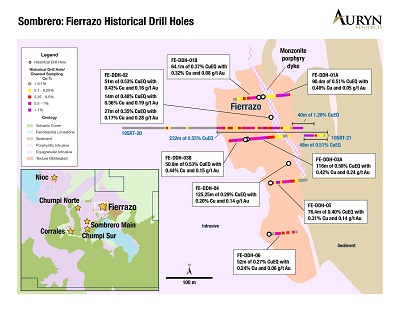
Figure 1: Illustrates the drill intercepts from the historical core at the Fierrazo exoskarn target. The drilling has defined a cohesive mineralized body measuring 300 meters in length and approximately 150 - 225 meters in width and is open to both the north and the south.
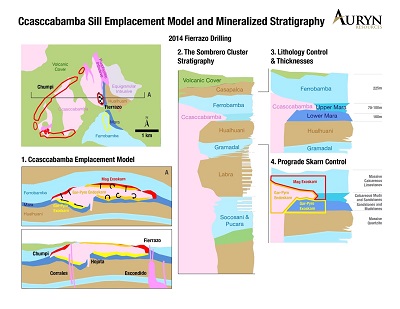
Figure 2: Illustrates the emplacement model of the Ccasscabamba diorite sill with exoskarn mineralization developed primarily within the Ferrobamba limestone, the calcareous shales and siltstones of the Upper Mara Formation and as endoskarn mineralization within the sill itself.
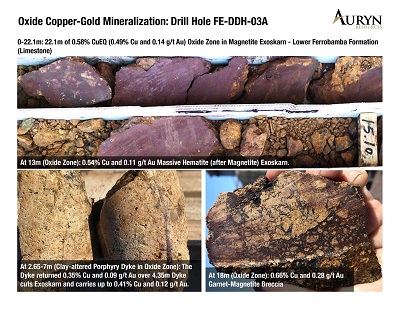
Figure 3: Illustrates oxide exoskarn mineralization hosted within the Ferrobamba limestone as well as later-stage mineralized monzonitic porphyry dykes from drill hole FE-DDH-03A. Note that the primary geophysical response in the oxide mineralization will be a magnetic high.
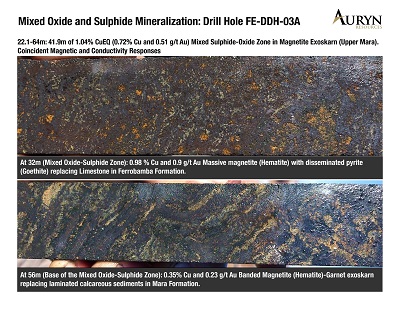
Figure 4: Illustrates mixed oxide and sulphide mineralization hosted within a magnetite exoskarn body within the calcareous shales and siltstones of the Upper Mara Formation from drill hole FE-DDH-03A. The primary geophysical responses within the mixed oxide and sulphide zone will be a magnetic high and a moderate conductivity response.
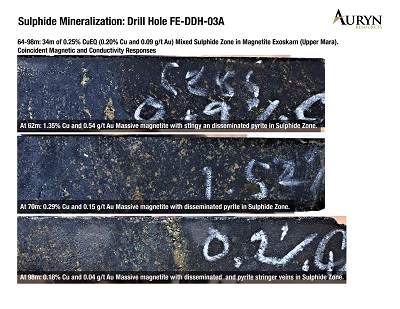
Figure 5: Illustrates sulphide mineralization hosted within a magnetite exoskarn body within the calcareous shales and siltstones of the Upper Mara Formation from drill hole FE-DDH-03A. The primary geophysical responses within the sulphide zone will be a magnetic high and a strong conductivity response.
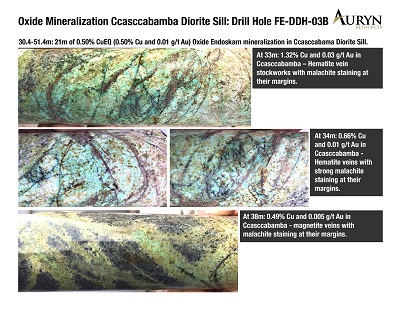
Figure 6: Illustrates copper oxide endoskarn mineralization within the Ccasscabamba diorite sill.
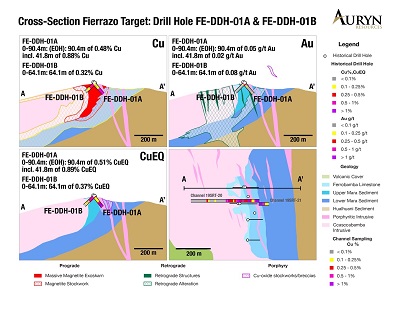
Figure 7: Illustrates geological cross sections and drill hole traces of FE-DDH-01A and FE-DDH-01B across the Fierrazo target area with respect to the prograde, retrograde and late porphyry stages of mineralization. It is important to note that the majority of the copper-gold mineralization from the historical drilling is hosted within the calcareous shales and siltstones of the Upper Mara Formation that has a thickness of approximately 70 - 100 meters. The majority of the Ferrobamba has been eroded at the Fierrazo target area.
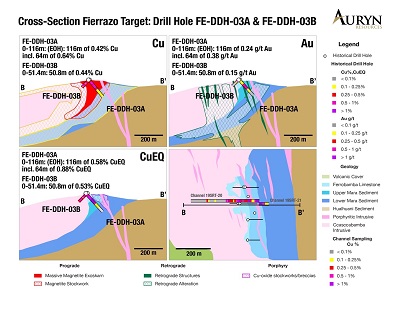
Figure 8: Illustrates geological cross sections and drill hole traces of FE-DDH-03A and FE-DDH-03B across the Fierrazo target area with respect to the prograde, retrograde and late porphyry stages of mineralization. It is important to note that the majority of the copper-gold mineralization from the historical drilling is hosted within the calcareous shales and siltstones of the Upper Mara Formation that has a thickness of approximately 70 - 100 meters. The majority of the Ferrobamba has been eroded at the Fierrazo target area.
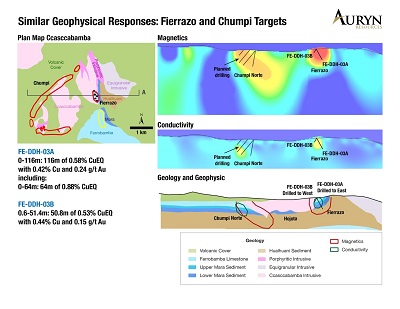
Figure 9: Illustrates the similar geophysical responses at the Fierrazo and Chumpi targets based on their collective magnetic and conductivity signatures.
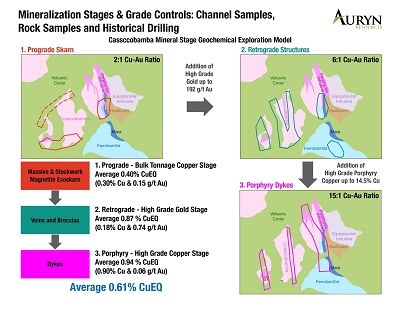
Figure 10: Illustrates the findings of Auryn's grade control study where all historical channel samples, rock samples and historical drilling were reviewed in terms of the three phases of prograde, retrograde and late-stage porphyry mineralization. Note that future drill plans will concentrate where all three phases of mineralization coalesce to provide the highest probability of drilling high grade copper-gold mineralization.
Michael Henrichsen, P.Geo, COO of Auryn, is the Qualified Person who assumes responsibility for the technical disclosures in this press release.
ON BEHALF OF THE BOARD OF DIRECTORS OF AURYN RESOURCES INC.
Ivan Bebek
Executive Chairman
For further information on Auryn Resources Inc., please contact Natasha Frakes, Manager of Corporate Communications at (778) 729-0600 or info@aurynresources.com, or visit www.aurynresources.com
About Auryn
Auryn Resources is a technically-driven, well-financed junior exploration company focused on finding and advancing globally significant precious and base metal deposits. The Company has a portfolio approach to asset acquisition and has seven projects, including two flagships: the Committee Bay high-grade gold project in Nunavut and the Sombrero copper-gold project in southern Peru. Auryn's technical and management teams have an impressive track record of successfully monetizing assets for all stakeholders and local communities in which it operates. Auryn conducts itself to the highest standards of corporate governance and sustainability.
About Sombrero
This project consists of the North Sombrero and South Sombrero properties, comprising over 120,000 hectares of mineral claims owned or optioned by Auryn Resources. The copper-gold Sombrero mining concessions are located 340 kilometers SE of Lima in southern Peru and are hosted in the Andahuaylas-Yauri belt. This belt is interpreted to be on the north-western margins of this Eocene-Oligocene aged copper-gold porphyry and skarn belt that hosts the Las Bambas, Haquira, Los Chancas, Cotambambas, Constancia, Antapaccay and Tintaya deposits. The project is characterized by a strong structural control and significant copper and gold values from historical surface samples. The principle targets at Sombrero are copper-gold skarn and porphyry systems and precious metal epithermal deposits.
Historical Fierrazo Diamond Drill Hole (DDH) Re-Sampling 2019 (Sombrero)
Sample intervals averaged 2 meters where historical sample intervals taken and otherwise were 2 meters. Where at least half of HQ diameter core was present it was sawed into equal parts on site. Otherwise historical crush rejects were used in lieu of the core. In total 481 quarter core, 20 half core, and 10 crush rejects, approximately 3-5kg each, were sent to ALS Lab in Lima, Peru for preparation and analysis. All samples were assayed using 30g nominal weight fire assay with atomic absorption finish (Au-AA25) and multi-element four acid digest ICP-AES/ICP-MS method (ME-MS61). Where MS61 results were near or greater than 10,000 ppm Cu the assays were repeated with ore grade four acid digest method (OG62). QA/QC programs using internal standard samples, field and lab duplicates and blanks indicate good accuracy and precision in a large majority of standards assayed.
Intervals were calculated using a minimum of a 0.1% Cu cut-off at beginning and end of the interval and allowing for no more than six consecutive meters of less than 0.1% Cu with a minimum length of the resulting composite of 5 meters.
Copper and gold equivalent grades (CuEq and AuEq) were calculated using gold price of US$1300/oz and copper price of US$3.00/lb.
SOURCE: Auryn Resources Inc.
View source version on accesswire.com:
https://www.accesswire.com/548650/Auryn-Intersects-116-meters-of-058-Copper-Equivalent-in-Historical-Drill-Core-from-Auryns-Fierrazo-Target-at-Sombrero